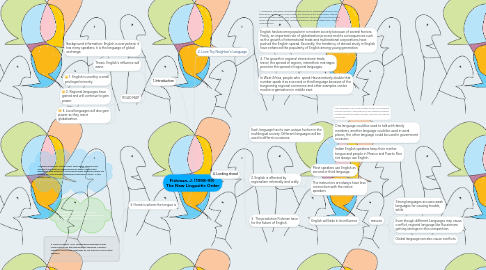
1. 1. Introduction
1.1. Background information: English is everywhere; it has many speakers; it is the language of global exchange.
1.2. Thesis: English's influence will wane.
1.3. ROAD MAP
1.3.1. 1. English is used by a small privileged minority.
1.3.2. 2. Regional languages have gained and will continue to gain power.
1.3.3. 3. Local languages will also gain power as they resist globalization.
2. 3. Home is where the tongue is
2.1. 1. Bernard Poignant's quote means that people require some emotional connections because human always regard their hometown with affection. As the world keeps growing, people are seeking for more intimate attachment with their culture. In this section, local
2.2. 2.He believes that the local languages associated with traditional cultures and origins emotionally appeal to the locals.
2.3. 3. There are about 1,200 standardized languages today. Never before has the phenomenon appeared in history. Whatever some small languages do not have too many native speakers.
3. 2. Love Thy Neighbor's Language
3.1. 1. Nowadays, individuals received the phenomena of spreading English by the televisions, sports,dress, food, songs, and internet, but it was actually started during the colonization. Also, as the colonization developed, it has became the major and original reason that caused spreading of English rather than modern Globalizations.
3.2. English has become popular in a modern society because of several factors. Firstly, an important role of globalization process and its consequences such as the growth of international trade and multinational corporations have pushed the English spread. Secondly, the tendency of abroad study in English have enhanced the popularity of English among young generation.
3.3. 4. The growth in regional interactions-trade, travel, the spread of regions, interethnic marriages promote the spread of regional languages.
3.4. In West Africa, people who speak Hausa natively double that number speak it as a second or third language because of the burgeoning regional commerce and other examples can be muslim organizatons in middle east.
4. 4. Looking ahead
4.1. Each language has its own unique fuction in the multilingual society. Different languages will be used in differnt occasions.
4.1.1. Two languages can co-exist when both fulfill different societal function. Although local and regional tongues creates separatism within society, they will be used by minotrities.
4.1.2. One language could be used to talk with family members, another language could be used in work places, the other language could be used in government occasion.
4.1.3. Indian English speakers keep their mother tongue and people in Mexico and Puerto Rico not always use English.
4.2. 2. English is affected by regionalism informally and orally.
4.2.1. Most speakers use English as second or third language.
4.2.2. The instructors are always have less connection with the native speakers
4.3. 3. The prediction Fishman have for the future of English.
4.3.1. English will fade in its influence
4.3.1.1. reasons
4.3.1.1.1. Strong languages accuses weak languages for causing trouble, while
4.3.1.1.2. Even though different Languages may cause conflict, regional language like Russian are getting stronger in this competition.
4.3.1.1.3. Global language can also cause conflicts.

